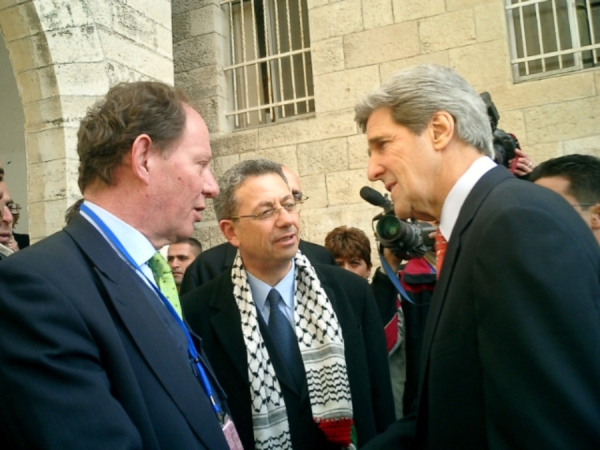When the European Parliament made a difference in the Middle East

Picture shows Edward McMillan-Scott (left), Palestine Presidential candidate Dr Mustafa Barghouti (centre) and John Kerry (right) who led the US Election Observer Mission to the January 2005 polls.
I was one of the longest-serving Vice-Presidents of the European Parliament (2004-2014) and my portfolio was Democracy and Human Rights. This gave me a leading role in the Euro-Mediterranean Parliamentary Assembly, founded in 2004 and the only body in which Israelis participated alongside EU and Arab parliamentarians. Parliamentary Assembly of the Union for the Mediterranean — Wikipedia
Josep Borrell, now the EU’s High Representative, has been particularly vocal, following his visit to the region in recent days. Borrell was President of the European Parliament when two key political events – the January elections — took place in the West Bank and Gaza in 2005 and 2006. I chaired the largest-ever EU election observer missions by the European Parliament – 30 MEPs – to the Palestine presidential election in 2005, when the veteran Mahmoud Abbas won the title following the death of Yasser Arafat, and the parliamentary election the following year, in which Hamas was the winner.
In 2005, my MEP delegation was impressed by the engaging liberal presidential candidate, medical Doctor Mustafa Barghouti. To this day, Barghouti is an active politician, and one day I hope his time will come to preside over a unified and free Palestine. John Kerry, then US Secretary of State, led the US observer delegation.
The result of the 2006 parliamentary election – in which Hamas won 44 per cent of the vote — presented a dilemma for myself and for my then US counterpart, former President Jimmy Carter. With his recently-deceased wife Rosalynn, Carter had campaigned for democracy in the Arab world. This culminated in the inquiries by Pew Research, first published in 2004, which showed that the appetite for democracy in the Arab world was overwhelmingly high, particularly among women. This was far from the Hamas ideology, and Carter and I felt uneasy at declaring the result for Hamas. Most Muslims Want Democracy, Personal Freedoms, and Islam in Political Life | Pew Research Center
The Palestinian “struggle” is one of the world’s oldest and can be traced back to Sykes-Picot agreement during the First World War, in which British and French diplomats redrew the post-war map of the Middle East with lines in the sand, preserving their national interests, in particular the oil reserves near Mosul, first detected by the black gold seeping through that very sand.
AdvertisementAn unwilling conspirator in what was quickly seen to be a cynical carve-up was my kinsman Col T E Lawrence (“of Arabia”), a romantic Arabist who led what became known as the Revolt in the Desert, to overturn the dominance of Turkey – the “Sick Man of Europe” – allied as she was then to Germany. The Hejaz railway, running from the Ottoman network to Medina, was the regular focus of Lawrence’s form of hit-and-run guerilla warfare.
Today’s stand-off is a contest between Israel’s extreme Right government, some of whose members seem unwilling to engage in civilized democratic norms of political behaviour and language, and the fanatics among the imprisoned Palestinian people, who have long used extreme violence as their prime means of gaining attention. Typically, the Al Aqsa brigade threatened to kill any British election observer venturing into Gaza during the parliamentary election.
Throughout my engagements in the Middle East, I was joined by deeply committed and knowledgeable Members of the European Parliament, of whom Josep Borrell was emblematic. We must all hope that his form of democracy prevails, or the world will be the loser.
Edward McMillan-Scott was a pro-EU Conservative MEP for Yorkshire & Humber from 1984. In 2009 he refused to join David Cameron’s new nationalist ECR Group and sat as an independent then Liberal until he retired in 2014. A Patron of the European Movement, he now leads a 100-strong forum of pro-EU academics, journalists and politicians in the UK.
Share this article:



